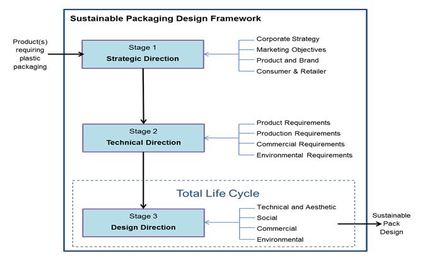
Summary: The overall research aim was to enable the environmental footprint of plastics packaging to be reduced through the most appropriate selection and utilisation of biopolymers whilst providing companies with a design framework to support their sustainable packaging /business strategy.
Project Description: Since their discovery, over 70 years ago, plastics have become omnipresent in our modern society. One of the largest users of plastics, particularly thermoplastics, is the packaging sector; accounting for approximately 40% of global plastics use annually. The majority of these plastics are manufactured from petrochemicals, derived from crude oil, natural gas and coal; non-renewable, finite resources that are being rapidly depleted by the wide range of human demands. Furthermore the commercial success of conventional plastics as a packaging material and its ability to resist degradation by natural processes has resulted in the growth of a highly visible post-consumer waste stream. The majority of this ‘post-consumer’ waste is still being sent to landfill or incinerated and when unmanaged, can contaminate the environment as litter. These two factors combined makes current plastics packaging both unsustainable and environmentally unfriendly. However, products need to be protected and preserved to be still useful when they reach the consumer. Plastics packaging is an effective means of achieving this and the benefits from its use can significantly outweigh the economic and environmental cost of its production. Plastics packaging is therefore likely to remain an essential requirement in modern supply chains and a key tool for the efficient and sustainable use of resources.
One proposed solution to this dichotomy has been the development of plastics from renewable materials derived primarily from plants (biopolymers). In order for biopolymers to make a viable and effective contribution to industrial sustainability, users of these materials need to have a better understanding of the true impacts of biopolymers and the environmental and sustainable benefits they can provide and more detailed guidance as to which materials should be used in what applications. To achieve this consideration must be given as to the company’s expectations of biopolymers, which options are most likely to meet these expectations, and ultimately what benefits could be achieved over the whole lifecycle. This highlighted the need for a holistic and systematic approach to support the decision making at each stage of the plastic packaging design and development process.
To facilitate this systematic approach, a framework was developed based on the three pack design stages identified as being substantially different to the standard pack design process, thus requiring additional support and direction (Figure 1). These are: Strategic, Technical and Design (creative). Due to significant requirements for information and knowledge processing, a Computer Aided Sustainable Plastics Packaging (CASPPa) design support tool was developed to support the implementation of this framework, providing industry with the means to: rapidly assess the potential strategic benefits of biopolymer packaging within their business; identify the most appropriate materials and suppliers; and to support the comparative assessment of different pack concept and designs.
Project Highlights:
- The development of a stepwise approach for translating the corporate and operational business sustainability strategy into a set of prioritised actionable requirements in the forma of a strategic sustainable pack design specification.
- The development of a Computer Aided Sustainable Plastics Packaging (CASPPa) design support tool that provides industry with the means to: rapidly assess the potential strategic benefits of biopolymer packaging within their business; identify the most appropriate materials and suppliers; and to support the comparative assessment of different pack concept and designs.
- The facilitation of the wider adoptionion of biopolymer packaging in applications which provide the greatest sustainability benefits through the appropriate selection, specification and application of biopolymers during the design stages.